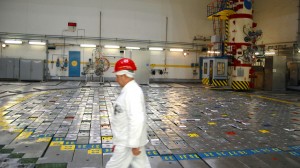
The first reactor was shut off in 2004, but the second reactor has continue functioning, making Lithuania one of the world's most dependent nations on nuclear power until Dec. 31. Photo by James Dahl.
VISAGINAS, Lithuania — On Thursday one of the world’s largest nuclear reactors and the last Chernobyl-type channel reactor outside Russia will be shut off forever.
Since the mid-1980s the Ignalina Nuclear Power Plant has supplied some three-fourth of Lithuania’s electricity needs, and allowed the country to export power to Russia, Belarus, Latvia and Estonia as well.
But design flaws and a lack of safety culture in the Soviet Union prompted the European Union to demand the shutdown of both reactors as a condition of Lithuania’s accession to the EU.
Yet despite a plea to keep the second reactor operating until mid-2012 (the first reactor was shut down in 2004), and hundreds of millions of euros invested in eliminating flaws and improving overall performance of the second rector, the EU insists that the plant be shut down before 2010.
The loss of some 1,320 megawatts of power output will immediately force Lithuania to look beyond its border for electricity imports, a prospect that has many fearful of dependence on Russia.
In addition, the loss of such a cheap source of energy will lead to a jump in electricity prices for both households and industrial consumers at a time when Lithuania’s economy is in a steep recession. The Baltic Open Energy Market, a planned liberalization of the Baltic states’ energy market, is allowing private investors to enter but with a higher pricetag. The Lithuanian Ministry of Energy forecasts that electricity prices will increase by about 30 percent starting in January.
“For the time being it’s not sure how much the prices will go up, it will depend on the price of the electricity we will buy on the electricity market,” Liudas Kolesinskas, a chief specialist with the ministry’s strategy division, told Baltic Reports. “It will be 30 percent more.”
No blackouts promised
Shutting down the Ignalina plant’s last reactor will take about three hours, starting Dec. 31 at 8 p.m. and ending at 11 p.m. During that time the capacity of the Elektrėnai Power Plant, which generates electricity by burning natural gas and oil, will be increased and electricity purchased from Belarus, Estonia, Latvia, Russia and Ukraine will flow in.
The energy ministry assures that no surprise New Year’s Eve power outages will occur.
“No, there can’t be any. I’m not aware of such a possibility,” Asta Žalnieriūtė, chief specialist with the ministry’s Ignalina Nuclear Power Plant decommissioning division, told Baltic Reports.
Lithuania hopes to build a new nuclear plant over the next decade, and earlier this month announced a tender to attract a Western strategic investor. Neighbors Estonia, Latvia and Poland are expected to obtain stakes in the project, which will likely be majority owned by the private investor. But given Russia’s drive to build a large nuclear power plant in Kaliningrad, and Belarus’ ambition to go nuclear with its plant not far from Vilnius, the region could become crowded with energy capacity, experts say.
Lithuania hopes it can build the first reactor, which will also be located in Visaginas, by 2018.
— Baltic Reports reporter James Dahl contributed to this article.













This “problem” has been well known for around six years but not solved yet. Looks like only within current year people around here has woken up little by little to see the reality. Why? Now there is a big possibility that Lithuanians as well as Latvians need to get much too overpriced solutions to get enough of electricity. For example some new gas turbine projects are not the best solutions and definitely not the cheap or even economical choise for end users but politics is politics and good consulting companies can sell even their own grandmother as a fountain of energy. Let´s hope Lithuanians will not make any “emergency” -solutions.